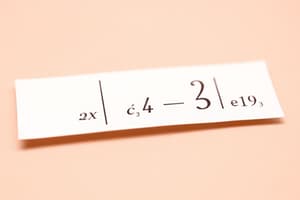Podcast
Questions and Answers
¿Cuántas posibles combinaciones de ropa podrías usar si seleccionas artículos solo de una maleta con dos conjuntos de ropa en cada una?
¿Cuántas posibles combinaciones de ropa podrías usar si seleccionas artículos solo de una maleta con dos conjuntos de ropa en cada una?
- 4
- 256
- 16 (correct)
- 1024
Si hay 4 opciones para cada una de las siguientes acciones, ¿cuántas combinaciones posibles se pueden formar seleccionando una opción de cada acción?
Si hay 4 opciones para cada una de las siguientes acciones, ¿cuántas combinaciones posibles se pueden formar seleccionando una opción de cada acción?
- 120
- 3240
- 720
- 1440 (correct)
¿Cuántos posibles números de 2 dígitos se pueden formar usando los dígitos del 0 al 11 permitiendo repeticiones?
¿Cuántos posibles números de 2 dígitos se pueden formar usando los dígitos del 0 al 11 permitiendo repeticiones?
- 1
- 1001
- 11
- 11001 (correct)
Si hay 6 vocales (incluyendo el espacio) en el alfabeto inglés, ¿cuántas posibles permutaciones circulares se pueden generar al reorganizarlas?
Si hay 6 vocales (incluyendo el espacio) en el alfabeto inglés, ¿cuántas posibles permutaciones circulares se pueden generar al reorganizarlas?
Hay 5 personas en la clase. ¿Cuántos posibles grupos de 3 personas se pueden formar?
Hay 5 personas en la clase. ¿Cuántos posibles grupos de 3 personas se pueden formar?
Si hay n cosas para ordenar, ¿cuántas formas hay para organizarlas según el método factorial?
Si hay n cosas para ordenar, ¿cuántas formas hay para organizarlas según el método factorial?
¿Cuál es el número total de formas en que puedes elegir un plato principal y un postre de un menú que ofrece 5 platos principales y 3 postres?
¿Cuál es el número total de formas en que puedes elegir un plato principal y un postre de un menú que ofrece 5 platos principales y 3 postres?
Un código de seguridad consta de 4 dígitos, donde cada dígito debe ser diferente. ¿Cuántos códigos de seguridad diferentes se pueden crear?
Un código de seguridad consta de 4 dígitos, donde cada dígito debe ser diferente. ¿Cuántos códigos de seguridad diferentes se pueden crear?
En un torneo de tenis, hay 12 jugadores. Si cada partido implica a 2 jugadores, ¿cuántos partidos se jugarán en total?
En un torneo de tenis, hay 12 jugadores. Si cada partido implica a 2 jugadores, ¿cuántos partidos se jugarán en total?
Un restaurante ofrece 3 entradas, 5 platos principales y 2 postres. Si un cliente elige un plato de cada categoría, ¿cuántos menús diferentes se pueden crear?
Un restaurante ofrece 3 entradas, 5 platos principales y 2 postres. Si un cliente elige un plato de cada categoría, ¿cuántos menús diferentes se pueden crear?
¿Cuántas palabras de 5 letras se pueden formar con las letras de la palabra 'PAPEL', si las letras pueden repetirse?
¿Cuántas palabras de 5 letras se pueden formar con las letras de la palabra 'PAPEL', si las letras pueden repetirse?
Hay 6 personas en una fila. ¿De cuántas formas diferentes se pueden organizar estas personas en un círculo?
Hay 6 personas en una fila. ¿De cuántas formas diferentes se pueden organizar estas personas en un círculo?
Flashcards are hidden until you start studying
Study Notes
Introduction
Problem solving is a crucial skill for university students who need it to succeed in their academic and professional careers. One area of mathematics where problem-solving skills are highly sought after is combinatorial math, which deals with counting techniques. In this article, we will present a comprehensive problem-solving guide for four fundamental concepts in combinatorial math: the principle of the sum, the principle of the multiplication, permutations, and combinations. We will discuss these concepts using real-life examples and practical exercises. Let's begin!
Principle of the Sum
The principle of the sum is used when we want to find the number of favourable outcomes from several alternative possibilities. It states that if there are n ways of doing something one way, and m ways of doing it another, then there are n + m ways of doing it either way. For example, if you have two shirts - blue and red - and two pairs of pants - jeans and khakis - you can choose from a total of 4 outfits (blue + jeans, blue + khakis, red + jeans, and red + khakis).
Exercise 1.1
You have three choices for breakfast, lunch, and dinner each day. How many different meal plans can you create over five days?
A) 125 B) 90 C) 30 D) 243
Hint: Apply the principle of the sum.
Principle of Multiplication
The principle of multiplication involves multiplying the number of ways together rather than adding them. This concept comes into play when considering repeating opportunities. A simple example would involve choosing 2 books from 4 available ones. When dealing with multiple categories, such as choosing two books from category A and two books from category B, the principle becomes 2 × 2 = 4 combinations.
Exercise 2.1
Suppose you have two suitcases, and each contains two sets of clothes. How many possible combinations of clothes could you wear if you select items from only one suitcase? Choose 2 items from the first suitcase and 2 from the second.
A) 16 B) 256 C) 1024 D) 4
Hint: Consider the principle of multiplication.
Permutations (Simple)
Permutations count the arrangements of objects without regard to their order. If there are n things to arrange, then there are n ways of arranging them according to the factorial method, i.e., n! ways. For a more in-depth understanding of permutations, consider n = 4; it means there are 4! = 4 × 3 × 2 × 1 = 24 ways to arrange them.
Exercise 3.1
If there are 4 options for each of the following actions, how many possible combinations can be formed by selecting one option from each action?
A) 120 B) 720 C) 1440 D) 3240
Hint: Think about the concept of permutations.
Permutations (With Repetitions)
In scenarios involving repetition, we must count all unique permutations. To do so, we use the formula (n+r-1)! / r!(n-1)!, where n represents the size of the set, and r denotes the number of items chosen at a time.
Exercise 4.1
How many possible 2-digit numbers can be formed by using digits 0 through 11 with repetition allowed?
A) 1 B) 11 C) 1001 D) 11001
Hint: Take into account permutations with repetition.
Permutations (Circular)
When objects are considered circularly arranged, an additional permutation exists due to rotation. Thus, there are 2n! circular permutations.
Exercise 5.1
If there are 6 vowels (including space) in the English alphabet, how many possible circular permutations can be generated by rearranging them?
A) 7! B) 2.7! C) 6! D) 6! / 2! * 2
Hint: Remember that there are 2n! circular permutations.
Combinations (Simple)
Combinations are similar to permutations, except they do not consider the order of the elements. They are used when the objects are indistinguishable. The formula for finding the number of combinations is nCr = n! / (n-r)!r!.
Exercise 6.1
There are 5 people in the class. How many possible groups of 3 people can be formed?
A) 10 B) 20 C) 25 D) 35
Hint: Consider the concept of combinations.
Studying That Suits You
Use AI to generate personalized quizzes and flashcards to suit your learning preferences.




